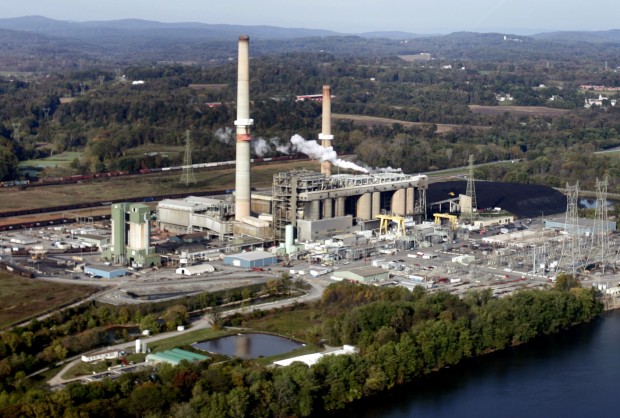Wolf says PA will move forward on Clean Power Plan
-
Susan Phillips

Carolyn Kaster / The Associated Press
PPL’s Brunner Island three-unit coal-fired plant located on the west bank of the Susquehanna River.
The Wolf administration says it will continue with plans to comply with new federal mandates to reduce the state’s carbon emissions despite a decision by the U.S. Supreme Court on Tuesday, which put a hold on Obama’s landmark effort to combat climate change.
In a surprise move, the court issued a stay on implementation of the Clean Power Plan while challenges to the rules play out in a lower court. The court is scheduled to hear arguments in June, while the states are supposed to have their implementation plans to the EPA by September. The CPP requires every state to come up with a plan to reduce its carbon emissions from the electric power sector. But 27 states sued the EPA, saying the Clean Air Act did not give the agency the authority to implement the rules. The ruling is a setback for the Obama Administration’s efforts to address climate change.
Pennsylvania is on target for coming up with its own implementation plan by the EPA’s September deadline, and has held 14 listening sessions on the rules across the state. Governor Wolf’s spokesman Jeff Sheridan says the Supreme Court’s decision will not impact the state’s ongoing efforts to comply with the CPP.
“Pennsylvania will continue planning and engagement with stakeholders on the Clean Power Plan, pending final decision of this issue by the Supreme Court,” Sheridan wrote in an email to StateImpact. “We will continue to closely monitor the ongoing legal process.”
The coal industry sees the Supreme Court decision as a surprise victory. Coal would be the big loser under the Clean Power Plan.
Abby Foster, a spokesperson with the Pennsylvania Coal Alliance, says she wants the Wolf administration to hold off on coming up with a plan.
“Hopefully this will cause some pause from the Wolf Administration,” Foster told StateImpact. “And for them to consider the fact that this is a historic decision from the Supreme Court to even stay a regulation, they should take that into account especially since Pennsylvania is in the top three in the nation for electricity generation and production.”
Coal has been hit hard by new environmental rules, but also the cheap price of natural gas. Just six years ago, coal produced about half of the nation’s electricity. Today, natural gas has gotten an edge over coal, and last July natural gas dominated electric power generation for the first time.
By the EPA’s own estimates, 14 to 19 percent of coal-fired power “is projected to be uneconomic” by 2030 under the Clean Power Plan. The agency predicts coal to slide from 36 percent of our electric generation this year to 27 percent in 2030.
Although the CPP is stalled, the EPA says regulating carbon dioxide through the Clean Air Act will stand up to court scrutiny. The Supreme Court, in a landmark decision in 2007, Massachusetts v. EPA, ruled that the EPA was obligated to regulate greenhouse gases.
A recent Penn State report warns Pennsylvania faces hotter, longer summers and more destructive storms and floods if the climate continues to warm unabated. The report found the state could face a 5 degree warming by 2050.
















